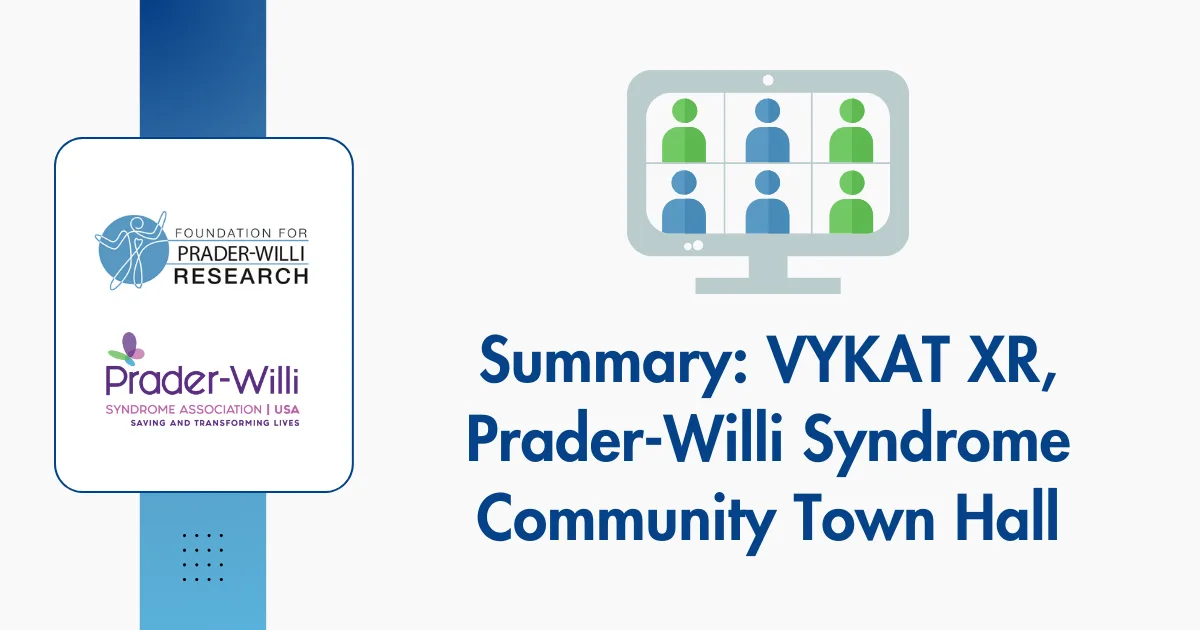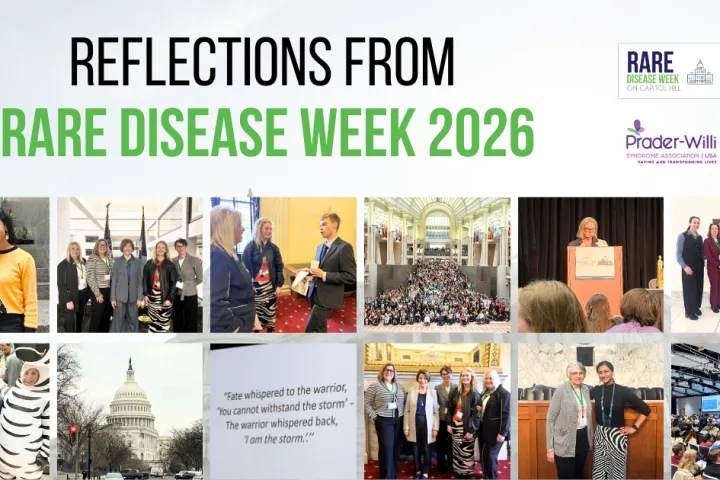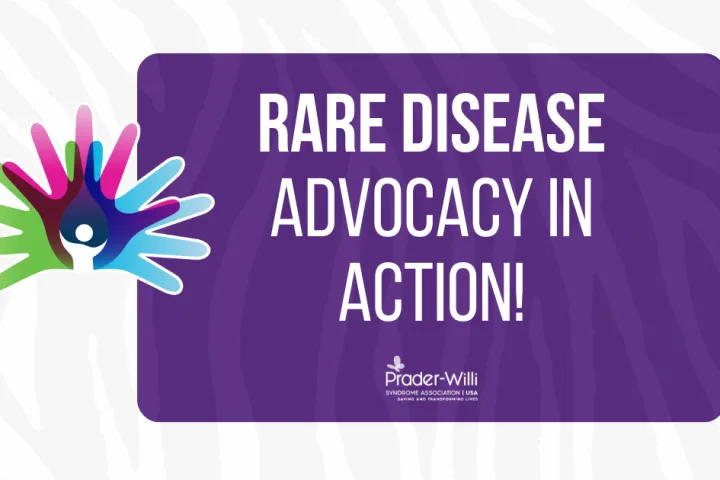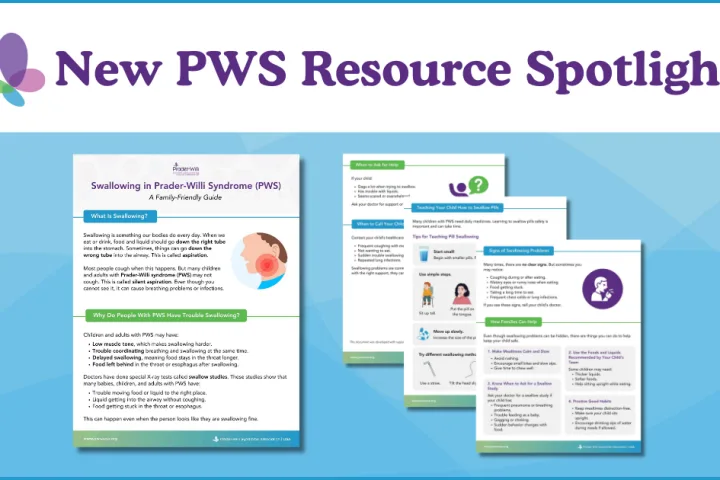On Tuesday, April 22, PWSA | USA and FPWR offered a PWS Community Town Hall for caregivers and guardians to hear more about people’s lived experiences with VYKAT XR. Experiences were shared from individuals who participated in the Phase 3 clinical trial of VYKAT XR, and attendees were able to ask questions of each other.
During the town hall, we heard from several parents who have experienced an overall positive impact of VYKAT XR in the Phase 3 clinical trial. Common benefits shared included improved behavior, fewer outbursts related to food, improved metabolism, and less worrying or talking about food. It was noted that it took time for these benefits to be observed; parents suggested that you shouldn’t expect immediate results.
Some side effects of the medication, which are consistent with the VYKAT XR label, were discussed by the trial participants, including high blood sugar levels (hyperglycemia), edema (too much fluid in the body), and increased hair growth throughout the body. The general consensus was that hair growth was ‘not a big deal,’ but some did use hair removal techniques to manage the growth. Those who experienced increased blood sugar levels shared that this could be a medically important concern for some individuals and suggested that glucose should be closely monitored when using VYKAT XR. Consistent with this, the VYKAT XR Medication Guide recommends checking blood sugar levels before you start VYKAT XR, at least 1 time every week for the first 2 weeks of treatment, then at least 1 time every 4 weeks and as needed during treatment.
Several townhall participants shared their experience with Panther One, the specialty pharmacy for VYKAT XR, has been positive and several families have already received their first shipment of medication.
Soleno Therapeutics has published several resources for interested families on their website: vykatkr.com, including:
- – VYKAT XR Fact Sheet – https://www.vykatxr.com/fact-sheet
- – Medication Guide – https://www.vykatxr.com/medication-guide.pdf
- – Prescribing Information – https://www.vykatxr.com/prescribing-information.pdf
- Additional data on safety and efficacy from the phase 3 clinical trial of VYKAT XR can be found in these peer-reviewed publications:
- – Long-term efficacy and safety profile of Phase 3 / Open Label Extension: Diazoxide choline extended-release tablet in people with Prader-Willi syndrome: results from long-term open-label study https://onlinelibrary.wiley.com/doi/10.1002/oby.23928
- – Phase 3 study results (prior to randomized withdrawal): Diazoxide Choline Extended-Release Tablet in People With Prader-Willi Syndrome: A Double-Blind, Placebo-Controlled Trial https://pmc.ncbi.nlm.nih.gov/articles/PMC10271219/
- – Comparison of Phase 3/Open Label Extension with PATH for PWS natural history study: Behavioral changes in patients with Prader-Willi syndrome receiving diazoxide choline extended-release tablets compared to the PATH for PWS natural history study https://jneurodevdisorders.biomedcentral.com/articles/10.1186/s11689-024-09536-x
- One of the most common questions raised during the town hall was: What percentage of the PWS community is likely to benefit from taking VYKAT XR? We are not yet able to provide a definitive answer. To help us track real-world outcomes, we will be adding a new survey to the Global PWS Registry. This will allow us to begin identifying trends over time. We encourage everyone who starts taking VYKAT XR to watch for this survey and complete it—your participation will be essential in helping the community better understand the impact of this treatment.
- VYKAT XR is FDA-approved for the treatment of hyperphagia in individuals with PWS ages 4 years and older. Ultimately, the decision to try VYKAT XR is one that should be made in consultation with your loved one’s doctor. Your doctor will review the patient’s history, answer your questions, and advise if VYKAT XR may be right for you.
Share this!





 Perry A. Zirkel has written more than 1,500 publications on various aspects of school law, with an emphasis on legal issues in special education. He writes a regular column for NAESP’s Principal magazine and NASP’s Communiqué newsletter, and he did so previously for Phi Delta Kappan and Teaching Exceptional Children.
Perry A. Zirkel has written more than 1,500 publications on various aspects of school law, with an emphasis on legal issues in special education. He writes a regular column for NAESP’s Principal magazine and NASP’s Communiqué newsletter, and he did so previously for Phi Delta Kappan and Teaching Exceptional Children. Jennifer Bolander has been serving as a Special Education Specialist for PWSA (USA) since October of 2015. She is a graduate of John Carroll University and lives in Ohio with her husband Brad and daughters Kate (17), and Sophia (13) who was born with PWS.
Jennifer Bolander has been serving as a Special Education Specialist for PWSA (USA) since October of 2015. She is a graduate of John Carroll University and lives in Ohio with her husband Brad and daughters Kate (17), and Sophia (13) who was born with PWS. Dr. Amy McTighe is the PWS Program Manager and Inpatient Teacher at the Center for Prader-Willi Syndrome at the Children’s Institute of Pittsburgh. She graduated from Duquesne University receiving her Bachelor’s and Master’s degree in Education with a focus on elementary education, special education, and language arts.
Dr. Amy McTighe is the PWS Program Manager and Inpatient Teacher at the Center for Prader-Willi Syndrome at the Children’s Institute of Pittsburgh. She graduated from Duquesne University receiving her Bachelor’s and Master’s degree in Education with a focus on elementary education, special education, and language arts. Evan has worked with the Prader-Willi Syndrome Association (USA) since 2007 primarily as a Crisis Intervention and Family Support Counselor. Evans works with parents and schools to foster strong collaborative relationships and appropriate educational environments for students with PWS.
Evan has worked with the Prader-Willi Syndrome Association (USA) since 2007 primarily as a Crisis Intervention and Family Support Counselor. Evans works with parents and schools to foster strong collaborative relationships and appropriate educational environments for students with PWS. Staci Zimmerman works for Prader-Willi Syndrome Association of Colorado as an Individualized Education Program (IEP) consultant. Staci collaborates with the PWS multi-disciplinary clinic at the Children’s Hospital in Denver supporting families and school districts around the United States with their child’s Individual Educational Plan.
Staci Zimmerman works for Prader-Willi Syndrome Association of Colorado as an Individualized Education Program (IEP) consultant. Staci collaborates with the PWS multi-disciplinary clinic at the Children’s Hospital in Denver supporting families and school districts around the United States with their child’s Individual Educational Plan. Founded in 2001, SDLC is a non-profit legal services organization dedicated to protecting and advancing the legal rights of people with disabilities throughout the South. It partners with the Southern Poverty Law Center, Protection and Advocacy (P&A) programs, Legal Services Corporations (LSC) and disability organizations on major, systemic disability rights issues involving the Individuals with Disabilities Education Act (IDEA), Americans with Disabilities Act (ADA), and the federal Medicaid Act. Recently in November 2014, Jim retired.
Founded in 2001, SDLC is a non-profit legal services organization dedicated to protecting and advancing the legal rights of people with disabilities throughout the South. It partners with the Southern Poverty Law Center, Protection and Advocacy (P&A) programs, Legal Services Corporations (LSC) and disability organizations on major, systemic disability rights issues involving the Individuals with Disabilities Education Act (IDEA), Americans with Disabilities Act (ADA), and the federal Medicaid Act. Recently in November 2014, Jim retired.